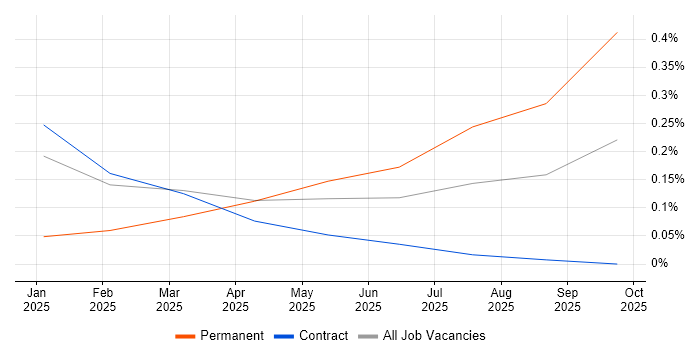Retrieval-Augmented Generation (RAG)
Scotland > Glasgow
The table below provides summary statistics and salary benchmarking for jobs advertised in Glasgow requiring Retrieval-Augmented Generation skills. It covers permanent job vacancies from the 6 months leading up to 16 November 2025, with comparisons to the same periods in the previous two years.
| 6 months to 16 Nov 2025 |
Same period 2024 | Same period 2023 | |
|---|---|---|---|
| Rank | 83 | - | - |
| Rank change year-on-year | - | - | - |
| Permanent jobs citing Retrieval-Augmented Generation | 2 | 0 | 0 |
| As % of all permanent jobs in Glasgow | 0.23% | - | - |
| As % of the Processes & Methodologies category | 0.27% | - | - |
| Number of salaries quoted | 1 | 0 | 0 |
| Median annual salary (50th Percentile) | £100,000 | - | - |
| Scotland median annual salary | £100,000 | - | - |
All Process and Methodology Skills
Glasgow
Retrieval-Augmented Generation falls under the Processes and Methodologies category. For comparison with the information above, the following table provides summary statistics for all permanent job vacancies requiring process or methodology skills in Glasgow.
| Permanent vacancies with a requirement for process or methodology skills | 740 | 825 | 631 |
| As % of all permanent jobs advertised in Glasgow | 86.65% | 85.94% | 96.78% |
| Number of salaries quoted | 330 | 439 | 485 |
| 10th Percentile | £29,000 | £29,650 | £28,700 |
| 25th Percentile | £32,588 | £38,625 | £37,500 |
| Median annual salary (50th Percentile) | £50,000 | £54,389 | £52,500 |
| Median % change year-on-year | -8.07% | +3.60% | - |
| 75th Percentile | £67,500 | £70,000 | £65,000 |
| 90th Percentile | £85,000 | £90,000 | £75,000 |
| Scotland median annual salary | £38,000 | £55,000 | £52,000 |
| % change year-on-year | -30.91% | +5.77% | -5.45% |
Retrieval-Augmented Generation
Job Vacancy Trend in Glasgow
Historical trend showing the proportion of permanent IT job postings citing Retrieval-Augmented Generation relative to all permanent IT jobs advertised in Glasgow.

Retrieval-Augmented Generation
Co-Occurring Skills & Capabilities in Glasgow by Category
The following tables expand on the one above by listing co-occurrences grouped by category. They cover the same employment type, locality and period, with up to 20 co-occurrences shown in each category:
